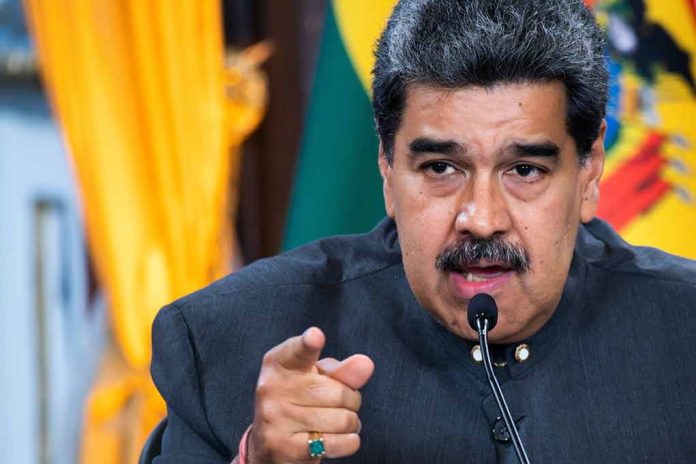
Venezuelan President Nicolas Maduro demands dialogue with Trump, amidst ongoing sanctions and tensions between the two nations.
At a Glance
- Maduro insists Trump must engage in dialogue with his regime
- Venezuela will maintain its current path regardless of U.S. election
- Maduro criticizes perceived U.S. interference and alleges coup plots
- U.S. sanctions remain in place due to human rights violations and drug trafficking accusations
- Biden administration has offered some concessions, including easing oil sanctions
Maduro’s Call for Dialogue
In a recent televised address, Venezuelan President Nicolas Maduro made a public appeal to Trump, emphasizing the need for dialogue between the two nations. Despite ongoing tensions and sanctions, Maduro asserted that Venezuela would continue on its current path, regardless of the outcome of the U.S. election.
Maduro’s statement comes amid a complex geopolitical landscape, where Venezuela maintains strong ties with countries like China, Russia, and Iran, while facing significant pressure from the United States. The socialist leader’s regime has been accused of human rights violations, electoral fraud, and drug trafficking, leading to severe U.S. sanctions.
Allegations of U.S. Interference
During his address, Maduro reiterated claims of U.S. involvement in alleged coup attempts against his government. He described these efforts as part of a “fascist model” that the United States supposedly intends to impose on Venezuela through destabilization tactics.
These accusations come despite recent concessions from the Biden administration, including the easing of certain oil sanctions and the release of key figures associated with Maduro’s regime. These moves were part of efforts to promote conditions for free and fair elections in Venezuela.
U.S. Sanctions and International Pressure
The United States has maintained a tough stance on Venezuela, imposing sanctions on Maduro and his regime for alleged cocaine trafficking and human rights abuses. These measures have significantly impacted Venezuela’s economy and its ability to conduct international trade.
Despite international pressure and the “Barbados Agreement” signed under U.S. observation, which called for “free and fair” elections in Venezuela, Maduro’s regime has been accused of failing to uphold its promises. Reports suggest an increase in the repression of dissidents and continued doubts about the integrity of Venezuela’s electoral process.
Looking Ahead
As Venezuela continues to navigate its complex relationship with the United States, the international community watches closely. The U.S. maintains a $15 million bounty for information leading to Maduro’s arrest, highlighting the ongoing tensions between the two nations. With Maduro’s latest call for dialogue, the ball now rests in the court of the next U.S. administration to determine the future course of U.S.-Venezuela relations.
Sources:
Venezuela’s Maduro: Next U.S. President Will Have to Find an ‘Understanding’ with Us













